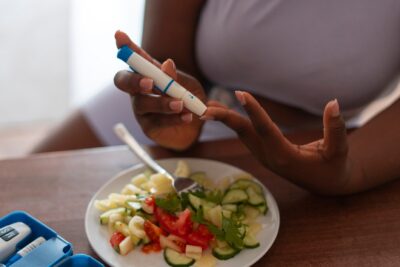100% Herbal & Natural |
Extra 10% OFF with code SATRISHI10 |
Backed by Ayurveda |
Free Shipping Above ₹399 |
100% Herbal & Natural |
Extra 10% OFF with code SATRISHI10 |
Backed by Ayurveda |
Free Shipping Above ₹399 |
100% Herbal & Natural |
Extra 10% OFF with code SATRISHI10 |
Backed by Ayurveda |
Free Shipping Above ₹399 |
100% Herbal & Natural |
Extra 10% OFF with code SATRISHI10 |
Backed by Ayurveda |
Free Shipping Above ₹399 |

Ayurveda, the ancient Indian system of medicine, offers a wealth of natural remedies for managing blood sugar levels. One of the easiest and most effective ways to incorporate Ayurvedic herbs into your routine is through herbal teas. These teas not only help regulate blood sugar levels but also offer numerous other health benefits, such as improving digestion and reducing inflammation. Let’s explore some of the top Ayurvedic teas that can support blood sugar control.
Ayurvedic teas are made from herbs and spices that are known to balance blood sugar levels by improving insulin sensitivity, reducing sugar absorption, and supporting overall metabolic health. These teas also offer a gentle, natural way to manage diabetes without the harsh side effects often associated with synthetic medications.
Herbal teas target the root causes of blood sugar imbalances, such as poor digestion, weak metabolism, and insulin resistance. Many of these teas also help balance the doshas (Vata, Pitta, Kapha) and improve the functioning of key organs like the pancreas and liver.
For best results, it’s recommended to drink these teas regularly, along with a balanced Ayurvedic diet and lifestyle. Consistency is key when it comes to managing chronic conditions like diabetes.

Here are some of the most effective Ayurvedic teas for balancing blood sugar levels:
Cinnamon is a popular spice with powerful blood sugar-lowering properties. Drinking cinnamon tea regularly can help improve insulin sensitivity and reduce fasting blood sugar levels.
How to make:
Boil 1 to 2 cinnamon sticks in a cup of water for 5-10 minutes. Strain and drink twice daily, especially after meals.
Fenugreek seeds are rich in soluble fiber, which slows down digestion and helps regulate the absorption of carbohydrates, thus controlling blood sugar levels.
How to make:
Soak 1 tablespoon of fenugreek seeds overnight in water. In the morning, boil the seeds in a cup of water, strain, and drink on an empty stomach.
Gudmar, also known as the “sugar destroyer,” is one of the best Ayurvedic herbs for managing blood sugar. It helps block the absorption of sugar in the intestines and reduces sugar cravings.
How to make:
Boil a teaspoon of dried Gudmar leaves in a cup of water for 5-7 minutes. Strain and drink daily, preferably after meals.
Bitter melon is another excellent herb for controlling blood sugar levels. It contains compounds that mimic insulin and help in lowering glucose levels.
How to make:
Boil dried bitter melon slices or powder in water for 5-10 minutes. Strain and drink once or twice a day.
Amla, or Indian gooseberry, is rich in vitamin C and antioxidants. It helps in improving insulin sensitivity and protecting pancreatic cells from oxidative damage.
How to make:
Mix 1 teaspoon of Amla powder with hot water and drink it daily, either in the morning or before meals.
Tulsi is a sacred herb in Ayurveda known for its numerous health benefits, including its ability to regulate blood sugar levels by reducing stress-related spikes in blood sugar.
How to make:
Steep fresh or dried Tulsi leaves in hot water for 5 minutes. Strain and enjoy 1-2 cups daily, preferably in the morning.
Turmeric has potent anti-inflammatory and antioxidant properties. It helps reduce insulin resistance and supports the overall function of the pancreas.
How to make:
Boil ½ teaspoon of turmeric powder in water or milk for 5-7 minutes. Add a pinch of black pepper to enhance absorption, then strain and drink.
Cumin seeds are known to improve digestion and enhance metabolism, both of which are important for managing blood sugar levels.
How to make:
Boil 1 teaspoon of cumin seeds in water for 5-7 minutes. Strain and drink after meals to aid digestion and control blood sugar.
Neem leaves are bitter but highly effective in controlling blood sugar by reducing glucose absorption and promoting insulin production.
How to make:
Steep a few fresh or dried neem leaves in hot water for 5 minutes. Strain and drink once a day, preferably in the morning.
Ayurvedic teas offer a natural, holistic way to help manage blood sugar levels. Incorporating these herbal teas into your daily routine, along with a balanced diet and regular physical activity, can make a significant difference in controlling Type 2 diabetes. Always consult with your healthcare provider before starting any new herbal regimen, especially if you’re on medication for diabetes.
No account yet?
Create an Account